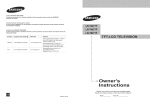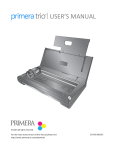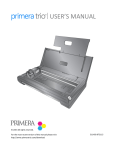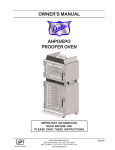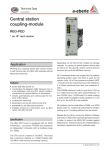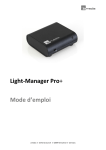Download Philips SRT9320/27 Universal Remote User Manual
Transcript
Register your product and get support at www.philips.com/welcome Prestigo SRT9320 EN User Manual On / Off switch (Rear of Prestigo) - Power button - Home / Setup button - AV button - Volume + / - button - Teletext button (Europe / Australia) Previous channel button (USA) - Mute button - Channel / Program + / – button - Menu button - Back / Exit button - Cursor buttons - OK button - Guide button - Info button Color buttons 3 3 3-6 3-4 4-5 6 6-7 6-7 7-20 7 8-9 9-12 12-13 13-15 15 15-18 18-19 19 19-20 20-22 22 22-24 22 23-24 25 IR receiver USB port (Bottom of Prestigo) Power supply jack EN 2 Table of contents Display / touchscreen 1 Your Prestigo 1.1 What’s in the box? 2 Getting started 2.1 Charging the battery 2.2 Setting up the remote control 2.3 Exit Setup mode 3 Using the remote control - Basic operation 3.1 Selecting devices 4 Extra possibilities - Advanced setup 4.1 Entering Setup mode 4.2 Setting up devices 4.3 Setting up activities 4.4 Selecting activities (use mode) 4.5 Setting up favorites 4.6 Selecting favorites (use mode) 4.7 Reconfiguring buttons 4.8 Reconfiguring the Power / AV buttons 4.9 Adjusting system settings 4.10 Installing Philips PrestigoSync software 5 Frequently asked questions 6 Technical specifications 7 Service and support 7.1 Need help? 7.2 Information to the consumer Equipment list English Table of contents IR transmitter (Top of Prestigo) 1.1 What’s in the box During setup you can select yourself the devices you wish to operate with the remote control (see table under chapter 2.2 ‘Setting up the remote control’). The on-screen instructions on the remote control display help you to easily set up and operate the remote control. Please verify that the packaging contains the following items: • Prestigo SRT9320 universal remote control • User manual • Quick Start Guide • Customer Demonstration sheet • Charging cable • USB cable • CD ROM containing Philips PrestigoSync software and user manual • Power plug Europe + Power plug UK Or: • Power plug Australia If, however, you require extra information, please consult this user manual. It is provided to help you set up and use the remote control. 2 Getting started To fully benefit from the support that Philips offers, register your product at www.philips.com/welcome • At ‘www.philips.com/welcome’, select ‘Register my product’ and follow the on-screen instructions for registration. 2.1 Charging the battery After setting up the Philips Prestigo universal remote control you can operate up to 20 different devices with it, use up to 20 activities and select a total of 100 favorites. Favorites are your favorite TV and radio channels that you can select and watch / listen with a single button press. Activities give you one-touch access to your home entertainment system. How to use this manual When you click with the cursor on a sentence in theTable of contents you automatically go to the right page / chapter. When you click on a page number, reference chapter or internetsite in the text you go there. Clicking on the blue language tab in the right top corner brings you back to the Table of contents. English Your Prestigo Your Prestigo 1 The remote control comes pre-installed with a rechargeable battery. When using the remote control for the first time, make sure the battery is fully charged. Do not disconnect the remote control from the power supply until the battery is fully charged ( ). Charging may take up to 3 hours and can take place with the remote control turned on or off. With the remote control turned on you can follow the charging process on the remote control display. EN 3 • country and slide it over the power plug of the charging cable. When the battery is fully charged the battery full icon ( appears at the top right corner of the screen. ) English 1 Select the adapter plug for your Notes • • 2 Insert the power plug into a wall outlet. 3 Turn the protective cap, covering the connectors, to the left. 4 Insert the plug at the other end of 5 the charging cable into the remote control power supply jack. If desired, set the On / Off switch to the right (On). The On / Off switch is located at the rear of the remote control. Use a pen or small screwdriver to set the switch. • The Philips Startup screen appears, followed by the Language Selection screen. The progress animation ( ) in the top right corner of the screen indicates the charging status. 2.2 Operation time of a fully charged battery is approximately 1 month but also depends on the intensity of usage. When the battery is almost empty the ) flashes in the top right corner of the screen. battery low icon ( Recharge the battery as described above. When the battery cannot be recharged anymore it needs to be replaced. For this, refer to chapter 7.2.2 ‘Replacing the battery’. Getting started OR: Fold out the contact blades. Setting up the remote control Make sure the remote control is fully charged and turned on (for this refer to chapter 2.1 ‘Charging the battery’). Avoid turning off the remote control with the On / Off switch at the rear for this will shorten battery life time. 1 Select your preferred language by touching the language (flag) in the Language Selection screen. Setu p Engli sh Fran çais Espa ñol Deut sch • Use the and buttons, at the bottom of the screen, to scroll through the list of available languages. • A welcome message appears. EN 4 Setu p Welc guide ome to th .Th e add de e next ste Prestigo setu ps vices to yo will help p ur SR you T932 0. 3 Follow the on-screen instructions to set up the remote control for all • devices you wish to operate, using the remote control. You can set up the remote control for any of the devices listed below, with a maximum of 20 devices. Device name Description TV Set-Top Box Traditional TV, flat screen TV and projection TV Cable box, satellite receiver, Digital Video Broadcasting Terrestrial device (DVB-T), IPTV, TNT (FR), Freeview (UK) Cable box, satellite receiver, Digital Video Broadcasting Terrestrial device (DVB-T), IPTV, TNT (FR), Freeview (UK) with recording capabilities (Hard Disk Drive) DVD player Blu-Ray player DVD Recorder DVD / Hard Disk Drive combination, PVR, (+HDD)DVR Video cassette player and recorder Personal Computer, Windows Media Center Game Console MP3 player docking station and audio-video accessories (Switches, Apple TV, etc.) Set-Top Box Recorder DVD Player Blu-Ray Player DVD Recorder Hard Disk Recorder VCR PC Game Console MP3 Player Dock Digital Media Receiver Receiver Digital Media Receiver, Media Adapter, Squeezebox AV Receiver, Amplifier + Tuner combination, sound processor Home Theatre System Home Theatre System, Home Entertainment System Audio System Audio System, AudioSet, Hifi system Amplifier Amplifier, Preamplifier, Active Speaker System Radio tuner Radio Tuner, Digital Audio Broadcasting (DAB) CD player CD player and recorder, Super Audio CD player (SACD) Tape Audio cassette tape player and recorder, DAT, DCC Minidisc Minidisc player and recorder TV / DVD Combo TV with integrated DVD TV / VCR Combo TV with integrated VCR TV / VCR / DVD Combo TV with integrated VCR and DVD DVD / VCR Combo DVD / VCR combination Projector Video projector Video CD / Laser Disc Video Compact Disc, Laser Disc, Karaoke HD-DVD player High-Definition DVD player Phono Turntable TiVo Digital Video Recorder* Satellite Radio Satellite Radio Receiver* * USA only EN 5 English button to continue With the button you go back to the Language Selection screen. Getting started 2 Touch the 1 To exit the initial Setup at any time, 2 • press the HOME button. • The message ‘Do you want to save your settings and exit setup’ appears. Touch the ‘Yes’ button to exit. If you accidentally press the HOME button during initial Setup, you can enter Setup mode again by touching the ‘No’ button. Also refer to chapter 4.1 ‘Entering Setup mode’. Notes • • 3.1 Selecting devices 1 Press the HOME button. • 2 The Home screen appears. The ‘Devices’ tab is highlighted and the devices for which the remote control is set up are displayed. For adding devices, refer to chapter 4.2. ‘Setting up devices’. When more pages with devices are available the button appears. Touch the button to go to the next page. With the button you go back to the previous page. Select the desired device by touching the corresponding button. Hom es TV Set-to p Box DVD Recei ver Using the remote control - Basic operation After initial setup you can use the remote control to operate your devices. For operation the appropriate hard buttons on the remote control can be used as well as the touchscreen buttons that are displayed when a device is selected. Activ ities In order to be able to use the remote control, it should be set up for at least one device. Devices for which the remote control is set during this initial set up can be deleted, renamed, rearranged or replaced afterwards. For this, refer to chapter 4.2 ‘Setting up devices’. • 3 e Devic A keypad with buttons for operating the selected device appears. Keyp ad 1 7 5 8 0 • Touch the With the Favo rite s 2 4 3 6 9 ente r button to go to the next keypad. button you go back to the previous keypad. EN 6 English Exit Setup mode Using the remote control 2.3 Note If a device does not respond properly to a button command you can have the remote control search for the button function or learn the function from the original remote control. For this refer to chapter 4.7.4.1 ‘Searching the database’ and / or chapter 4.7.4.2 ‘Learning button functions’. 4 4.1 Extra possibilities - Advanced setup English • • buttons (keypad) and the appropriate hard buttons on the remote control. Touch the button to go back to the list of available devices. To set up the remote control for other (more) devices, refer to chapter 4.2.1 ‘Adding devices’. Entering Setup mode When in normal operation mode, pressing the HOME button for 3 seconds will display a toolbar. This toolbar enables you to configure the current screen and contains the following tools: (add): adds items (devices, activities, etc.) to the current screen. (delete): deletes items (devices, activities, etc.) from the current screen. (edit): renames and reconfigures items (devices, activities, etc.). (done): confirms settings and returns to normal operation mode. • • • Extra possibilities 3 You can now operate the selected device by using the touchscreen When more items are available than can be displayed on the screen, the button appears. Touch the button to go to the next list of items. With the button you go back to the previous list. When an item is selected on the screen, the button appears. Press the button and use the arrows that appear to move the item to a different position on the screen. Press the button to exit Setup mode at any time. EN 7 When entering setup mode from the devices home screen, you can add, delete, rename and rearrange devices. 1 In the Home screen, touch the ‘Devices’ tab. • The devices for which the remote control is set up are displayed on the screen. Hom e Devic es Activ ities Wat ch TV Listen Wat ch Play 2 Keep the HOME button pressed for to m usic a mov ie 1 In the list of devices, select the device you wish to delete. • The Delete device screen appears. • The Home screen appears. The device is now deleted from the remote control memory. 2 Touch the button in the toolbar. 3 Touch the ‘Yes’ button to confirm. 4 Touch the button in the toolbar when finished. a gam e Note Recei ver 3 seconds. 3 Use the buttons in the toolbar to add, delete and edit devices. button in the toolbar when finished. 4 Touch the Buttons of the deleted device that are used elsewhere, e.g. in an activity or the volume buttons will be deleted as well. Check the activities you installed and reinstall them if necessary. For this refer to chapter 4.3 ‘Setting up activities’. Check the volume buttons for your devices and reinstall them if necessary. For this refer to chapter 4.2.4 ‘Copy volume buttons from another device’. 4.2.1 Adding devices 4.2.3 Renaming devices 1 Touch the 1 In the list of devices, select the device you wish to rename. 2 Touch the button in the toolbar. 2 3 button in the toolbar. • The Add device screen appears. Select the new device you wish to set up the remote control for (add) and follow the on-screen instructions. Touch the button in the toolbar when finished. • The Home screen appears. The remote control is now set up to operate the newly added device. English 4.2.2 Deleting devices Setting up devices Extra possibilities 4.2 • The Edit device screen appears. • The Setup screen appears. button in the toolbar. The Home screen appears. The device is now stored under the new name. 3 Touch the ‘Rename’ button. 4 Use the keyboard to enter the new name. 5 Touch the ‘OK’ button when finished. 6 Touch the • EN 8 You can change which volume buttons are used, for instance if you wish to use the volume buttons of the Amplifier to control the volume of the DVD player. 1 In the list of devices, select the device you wish to copy the volume to. 2 Touch the button in the toolbar. • The Edit device screen appears. • The Copy volume screen appears. • The Home screen appears. The volume settings are now copied. 3 Touch the ‘Copy volume buttons’ button. 4 Follow the on-screen instructions. 5 Touch the button in the toolbar when finished. Notes • • • • When changing the volume settings, the default volume settings of the remote control will be overwritten. Previously installed volume settings will be overwritten. Volume settings will be deleted when the volume source device is deleted. In ‘Add device’ mode, punched through volume buttons will not be available for testing. • 4.3 English When adding devices, the remote control copies the volume settings as follows: • If a device has its own volume buttons in the remote control database, these volume buttons will be used. • If a device has no volume buttons in the remote control database, the volume buttons of another device will be used automatically. 4.2.5 Rearranging devices 1 In the list of devices, select the device you wish to rearrange. 2 Touch the button in the toolbar. 3 Use the arrows to move the device to the preferred position. 4 Touch the button in the toolbar when finished. The Home screen appears. Setting up activities Activities enable you to turn a number of devices on and off with a single button press while all buttons needed for operating the devices immediately become available. For example: touching the ‘Watch DVD’ activity can automatically turn on your TV, DVD player and Home Theater System, select the correct AV inputs on your TV and Home Theater System and displays the buttons that can be used for operating these devices. Only the buttons that you typically use when watching a DVD will be shown. Start / Stop Activity macro After selecting all desired devices for the activity, you can set up a start and stop macro for the activity. In the start macro you define a series of button presses that turn on your devices and select the correct input(s) when you activate the activity. In the stop macro you define a series of button presses that turn off your devices when you deactivate the activity. Note that a short delay is required between each button command that is sent, otherwise your devices might not respond properly. EN 9 Extra possibilities 4.2.4 Copy volume buttons from another device Example Start Activity macro for ‘Watch DVD’: 1 Turn on TV. - Standard delay of 0.25 seconds is automatically inserted. 2 Turn on DVD. 3 User-defined delay of 10 seconds to wait for the TV to turn on. 4 Select input 1 on TV. Example Stop Activity macro for ‘Watch DVD’: 1 Turn off TV. 2 - Standard delay of 0.25 seconds is automatically inserted. Turn off DVD. Tips and tricks for setting up Macros A/V input selection On most remote controls A/V input selection is done by cycling through the available input sources, using the A/V button and then selecting the desired source (cyclic input selection). Some remote controls, however, are equipped with physical buttons (TV, DVD, etc.) that directly select a particular input source (discrete input selection). In order to make your macros more reliable use discrete input selection where possible. Maybe the original remote control does not have discrete commands, but nevertheless the Prestigo supports them. Command sequences Before you set up a macro, it is useful to try out the sequence of commands you intend to program, using the original remote control. You may encounter issues that can help you optimize the macro. E.g. for most TVs the sequence 0 and 1 in a macro will perform better than 1 only. Other TVs might need -/-- 1 2 iso 1 2, etc. Button press duration For some devices it may be necessary to extend the duration of an IR command (button press) for these devices need a long button press on the original remote control in order to perform certain functions. E.g. some Panasonic TVs only turn on after a long press on the Power (B) button and some Philips DVD players only eject a disc after a long press on the Stop button. Delay time Sometimes delay times between IR commands (button presses) are needed, for the receiving device needs some time to react. E.g. after turning on your TV, it may take a couple of seconds before you are able to change inputs. Also when setting up favorites delays may be needed since the receiving device(s) need(s) some time to react (for this refer to chapter 4.5 ‘Setting up favorites’). You can easlily try this out by pressing 1 and 2 very fast after each other on the original remote control. If your TV switches to channel 12, no delay time is needed. If your TV switches to channel 1 a delay time is needed. EN 10 English It might occur that input names used by the remote control differ from the names used on your device (e.g. ‘Input 1’ could be ‘HDMI’, ‘Input 2’ could be ‘RGB’, etc.). Try all input commands and check whether your device reacts. Extra possibilities If you do not set up start / stop macros, all devices have to be turned on / off manually one after another. This can be easily done by pressing the ‘On’ and ‘Off ’ buttons in the Power screen that appears after selecting the activity. • Touch the ‘Yes’ button when you are asked if you wish to set up macros and follow the on-screen instructions. 1 In the Home screen, touch the ‘Activities’ tab. • The available activities (if already added) are displayed on the screen. Hom Devic Liste n to Wat ch • 3 seconds. • The Setup toolbar appears. You can now add, delete, rename and rearrange activities. Press the button to exit Setup mode at any time. e a mov ie a gam e 4.3.1 Adding activities English The Delete activity screen appears. • The Setup Activities screen appears. button in the toolbar when finished. The last used Activities screen appears. The activity is now deleted from the remote control memory. 4 Touch the music Wat ch Play • 3 Touch the ‘Yes’ button to confirm. • TV a mov ie a gam 1 Select an activity and follow the on-screen instructions. 2 Touch the button in the toolbar. e Activ ities Wat ch Play 2 Keep the HOME button pressed for es 4.3.2 Deleting activities 4.3.3 Renaming activities 1 In the list of activities, select the activity you wish to rename. 2 Touch the button in the toolbar. • The Edit activity screen appears. • The Setup screen appears. button in the toolbar. The last used Activities screen appears. The activity is now stored under the new name. 3 Touch the ‘Rename’ button. 4 Use the keyboard to enter the new name. 5 Touch the ‘OK’ button when finished. 6 Touch the • 1 Touch the 4.3.4 Editing Start / Stop Activity Macros 1 In the list of activities, select the activity for which you wish to edit the 2 2 Touch the • 3 button in the toolbar. • The Add activity screen appears. Select an activity and follow the on-screen instructions. Touch the ‘Help’ button if you need extra information. Touch the button in the toolbar when finished. • The last used Activities screen appears. The activity is now stored in the remote control memory. Extra possibilities Testing It is advised to test an activity macro twice, before actually using it. If, in the second test, the macro behaves different than in the first test, you may have included cyclic codes for A/V input selection or you did not include enough delay times. In this case, adapt the cyclic codes to discrete codes and / or include more (or longer) delay times. macro(s). 3 button in the toolbar. • The Edit Activity screen appears. Touch the ‘Edit activity start macro’ or the ‘Edit activity stop macro’ button. • The Edit macro screen appears. EN 11 5 • 6 4.3.5 Rearranging activities 1 In the list of activities, touch the activity you wish to rearrange. 2 Touch the button. 3 Use the arrows to move the activity to the preferred position. 4 Touch the button in the toolbar when finished. • 4.4 The last used Activities screen appears. • If a ‘Start Activity’ macro has been set up for the activity, the macro will be executed when selecting the activity in the Home screen. All activity devices will be turned on automatically and the required inputs will be selected. For this refer to chapter 4.3 ‘Start / Stop Activity macro’. If a device did not turn on, touch the ‘On’ button under the device name in the screen. Stop an activity (with Activity Macro) 1 Press the Power (B) button. • The Power screen appears. The activity devices are displayed. 2 Touch the ‘Activity off ’ button or press the Power (B) button again to stop the activity and turn off all activity devices. Selecting activities Powe r TV On DVD On Radio Start an activity 1 Make sure you have left Setup mode (the toolbar should not be visible). 2 Start an activity by touching its button on the screen. • Use the keypad(s) and appropriate hard buttons on the remote control to operate the activity devices. • Touch the button to go to the next keypad. With the button you go back to the previous keypad. Hom e Devic es Activ ities Wat ch TV Listen Wat ch Play Off Stop an activity (without Activity Macro) 1 Press the Power (B) button. • The Power screen appears. The activity devices are displayed. to m usic a mov ie a gam e EN 12 English and buttons in the toolbar to add / delete macro buttons. Use the button in the toolbar to adapt delay times and button press duration. This may be necessary to turn on devices that require a long button press (for example some Panasonic TVs). In this case you need to extend the duration of the button press that powers on this device. Follow the on-screen instructions. Select a button and touch the button to rearrange the items in the macro. Touch the button in the toolbar when finished. • The last used Activities screen appears. The new settings for the macro(s) are now stored. Extra possibilities 4 Use the 3 4.5 • Setting up favorites 4 Favorites are your favorite TV and radio channels that you can select and watch / listen with a single button press. 1 In the Home screen, select a device or activity. 2 Touch the ‘Favorites’ tab. • The available favorite channels (if already added) are shown on 1 2 3 the display. 4 Wat ch TV Keyp ad Favo rite s 7 5 8 9 0 3 Keep the HOME button pressed • for 3 seconds. • The Setup toolbar appears. You can now add, delete, rearrange and rename favorites. Press the button to exit Setup mode at any time. 6 ente 4.5.2 Deleting favorites 1 In the list of favorites, select the favorite channel you wish to delete. 2 Touch the button in the toolbar. • The Delete favorite screen appears. • The Setup screen appears. button in the toolbar when finished. The last used Favorites screen appears. The channel is now deleted from the remote control memory. 3 Touch the ‘Yes’ button to confirm. 4 Touch the r Disco very add and touch the ‘OK’ button. • The remote control now checks if the favorite channel name and icon are available in the internal database. Follow the on-screen instructions to select the channel name and assign button presses to it. Touch the ‘Help’ button if you need extra information. Touch the button in the toolbar when finished. • The last used Favorites screen appears. The channel is now added to the remote control memory. • Chann el RTL 4.5.3 Renaming favorites 1 In the list of favorites, select the favorite channel you wish to rename. 2 Touch the button in the toolbar. • The Edit favorite screen appears. 3 Touch the ‘Rename’ button. 4 Use the keyboard to enter the new name. EN 13 English 4.5.1 Adding favorites 1 Touch the button in the toolbar. 2 Use the keyboard to enter the name of the favorite channel you wish to the devices. Extra possibilities 2 Touch the Off buttons to turn off 5 Touch the ‘OK’ button when finished. 1 In the list of favorites, navigate to the page which contains the favorite 6 2 Keep the HOME button pressed for 3 seconds to enter Setup mode. 3 Select the favorite you wish to edit. 4 Touch the button in the toolbar. 4.5.4 Changing the channel icon 1 In the list of favorites, select the favorite channel for which you wish to 2 3 4 5 6 change the icon. Touch the button in the toolbar. • The Edit favorite screen appears. Touch the ‘Change channel icon’ button. • The Setup Favorites screen appears. Select the desired icon. Touch the ‘OK’ button when finished. • The Setup screen appears. Touch the button in the toolbar. • The last used Favorites screen appears. The favorite channel is now stored with the new icon. • English for which you wish to change the channel number. The Edit favorite screen appears. 5 Touch the ‘Edit channel macro’ button. 6 7 8 Extra possibilities • The Setup screen appears. Touch the button in the toolbar. • The last used Favorites screen appears. The favorite is now stored under the new name. • The Edit macro screen appears. • The ‘action’ list for this channel is displayed. Use the button in the toolbar to delete the old digits. Use the button in the toolbar to enter the new digits. Follow the on-screen instructions. Touch the button in the toolbar when finished. • The Setup screen appears.The new macro is now stored and will be sent out when selecting the favorite channel. 4.5.5.2 Optimizing the channel macro performance 4.5.5 Editing a channel macro You can tweak the channel macro for optimal performance by fine-tuning the delay times and button press duration to allow faster channel switching. Delay time and button press duration depend on the reaction time of the device. 4.5.5.1 Changing the channel number 1 In the list of favorites, navigate to the page which contains the favorite When a favorite channel is selected, the remote control sends outs a macro to select the channel number. E.g. for channel 25 the remote control sends out macro ‘2 - delay time - 5’. The delay time is the time after which the next digit in the macro is sent. If, for whatever reason, the cable company changes the channel position (e.g. new position 127), you have to enter the new macro manually into the remote control memory. E.g. ‘1 - delay time - 2 - delay time - 7’. 2 Keep the HOME button pressed for 3 seconds to enter Setup mode. 3 Select the favorite you wish to edit. 4 Touch the button in the toolbar. for which you wish to optimize macro performance. • The Edit favorite screen appears. • The Edit macro screen appears. button in the toolbar. 5 Touch the ‘Edit channel macro’ button. 6 Touch the EN 14 4.5.6 Rearranging favorites 1 2 3 4 Reconfiguring buttons The remote control is equipped with the most used functions for operating your devices. However, if you miss certain functions from your original remote control, you can add these functions via the Setup menu. In this menu you can also delete, rename and rearrange button functions and repair buttons that do not function properly. • When a device is selected and its keypad is displayed, keep the HOME button pressed for 3 seconds. • The Setup toolbar appears. You can now add, delete, rename and repair buttons. Disco very In the list of favorites, touch the favorite channel you wish to rearrange. Touch the button. Use the arrows move the favoritel to the preferred position. Touch the button when finished. • The last used Favorites screen appears. 4.6 Selecting favorites Wat ch favorite TV or radio channel you wish to watch / listen to. TV Keyp ad Favo rite s CNN MTV Disco very Chann el RTL • Chann el RTL 4.7.1 Adding buttons 1 Make sure you have left setup mode (the toolbar should not be visible). 2 In the list of favorites, touch the • 4.7 The remote control sends out a signal and the TV / tuner / receiver switches to the selected channel. Touch the and buttons to scroll through your favorites. 1 Touch the 2 3 4 5 button in the toolbar. • A Functions List appears on the screen. Touch the button function you wish to add. Follow the on-screen instructions for testing the button. Touch the ‘Yes’ button if the new button functions properly. • The tool bar appears. Touch the button in the toolbar when finished. • The last used Setup screen appears. The button is now added to the keypad. EN 15 English 8 duration. Follow the on-screen instructions. Touch the button in the toolbar when finished. • The Setup screen appears.The new delay times and / or button press duration are now stored. Extra possibilities 7 Use the ‘+’ and ‘–’ buttons to adjust delay times and channel press 4.7.2.1 Deleting buttons 1 In the Setup screen, select the button you wish to delete. 2 Touch the button in the toolbar. 3 Touch the ‘Yes’ button to confirm. 4 • The Setup toolbar appears. Touch the button in the toolbar when finished. • The Setup screen appears. The button is now deleted from the remote control memory. 4.7.3 Renaming buttons 1 In the Setup screen, select the button you wish to rename. 2 Touch the button in the toolbar. • The Edit button screen appears. • English Buttons within an activity can be edited afterwards. For activities, refer to chapter 4.3 ‘Setting up activities’. For deleting, rearranging, renaming, fixing and learning buttons, refer to the relevant chapters in 4.7 ‘Reconfiguring buttons’. For adding buttons to your activity pages: 1 When an activity is active and a keypad is displayed, press the HOME button for 3 seconds. • The Add button screen appears. 2 Touch the button in the toolbar. 3 Select the device from which you wish to add a button to the keypad. Follow the on-screen instructions. 4 Touch the button in the toolbar when finished. • The Setup screen appears. The button is now added to the remote control memory. 3 Touch the ‘Rename’ button. 4 Use the keyboard to enter the new name. 5 Touch the ‘OK’ button when finished. The Setup screen appears. button in the toolbar when finished. The last used Setup screen appears. The button is now stored under the new name. 6 Touch the • 4.7.4 Repair a button If a device does not respond properly to a button command you can have the remote control search for the button function in its database or learn the function from the original remote control. Note that buttons in an activity belong to a certain device. If a button is repaired within an activity, it will also be repaired in the corresponding device and vice versa. 4.7.4.1 Searching the database 1 Make sure the receiving device is able to respond. E.g. when you try to 2 3 4 5 6 7 fix the Play button for your DVD player, make sure to insert a DVD in the DVD player otherwise the Play button is not able to function. Touch the button in the toolbar. • The Edit button screen appears. Press / touch the (hard) button that does not work. Touch the button in the toolbar. Select ‘Repair this button’. Select ‘Search’ in the screen that appears and follow the on-screen instructions. Touch the button in the toolbar when finished. • The last used Setup screen appears. The button is now fixed. EN 16 Extra possibilities 4.7.2 Editing activity buttons English 4.7.4.2 Learning button functions When a button could not be found in the remote control database you can learn the remote control the function from the original remote control. 25 - 50 mm Extra possibilities Note Any function already stored under a button will be will be overwritten by the new function. Tips on learning button functions 2 Touch the • • 3 4 5 6 • • Some functions of some types of remote control might not be learned. Keep at least 1 metre (3.3 feet) away from incandescent or low-energy lights when learning. Note that the IR receiver, used for learning button functions, is located at the bottom of the remote control. You can store a function under any of the available buttons, except under: - the HOME button in the Devices screens: - the HOME, POWER (B) and AV buttons in the Activities screens; - any button in the Home screens. 1 Place both remote controls on a flat surface (like a coffee table) and aim them in such way that the IR transmitter (at the top) of the original remote control points at the IR receiver (at the bottom) of the SRT9320. 7 button in the toolbar. • The Edit button screen appears. Press / touch the (hard) button that you wish to learn a new function. Touch the button. Select ‘Repair this button’. Select ‘Learn’ in the screen that appears and follow the on-screen instructions. Touch the button when finished. • The last used Setup screen appears. The button has now successfully learned the new function. If learning fails: • Try keeping the button pressed for a longer or shorter period of time. • Adjust the distance between the two remote controls (closer or further away). • If problems reoccur with the same button, check if the original remote control is transmitting and operates the target device. Keep about 25 - 50 mm in between the remote controls. You may need to adjust the height of one of the remote controls to achieve this. EN 17 • 4.8 The last used Setup screen appears. 3 Keep the HOME button pressed 4 5 6 Power Enables you to turn devices on and off without going back to the Home screen first. E.g. when you select an activity and one or more devices do not turn on automatically, you can turn on the device(s) by pressing the corresponding ‘On’ button(s) in the Power screen. When a device of a previously selected activity does not turn off automatically when a new activity is selected, you can turn off the device by pressing the corresponding ‘Off ’ button in the Power screen. 1 Select an activity. 2 Press the Power (B) button. • The Power screen appears. On Off English DVD Reconfiguring the Power / AV buttons In the Power / AV menu you can change the buttons that will be used for turning on / off devices and the buttons that are used for input selection in an activity without going back to the Home screen first. DVD for 3 seconds. • The Setup screen appears. Select the On or Off button you wish to change. Follow the on-screen instructions. Touch the button in the toolbar when finished. • The Power screen appears. The new button is now added. Extra possibilities 4.7.5 Rearranging buttons 1 Select the button you wish to rearrange. 2 Touch the button. 3 Use the arrows to move the favorite to the preferred position. 4 Touch the button when finished. A/V Enables you to select A/V inputs without going back to the Home screen first. E.g. when you select an activity and one or more A/V inputs are not automatically selected, you can select the input(s) by pressing the corresponding A/V button(s) in the A/V screen. 1 Select an activity. 2 Press the AV button. • The AV inputs screen appears. 3 Keep the HOME button pressed 4 5 for 3 seconds. • The Setup screen appears. Select the AV button you wish to change. Follow the on-screen instructions. Receiv er AV EN 18 4.9 Adjusting system settings In the System settings menu you can adjust a number of default remote control settings to suit your own personal preferences. 1 In the Home screen, touch the ‘Devices’ tab. • The available devices are shown on the display. Hom e Devic es Activ ities Wat ch TV Listen 2 Keep the HOME button pressed for 3 seconds. • The Setup screen appears. to m usic W x • DVD Recei 3 Touch ‘My Prestigo’. • 5 6 selects English, French, Spanish, German, Dutch, Portuguese, Italian or Russian language. - Brightness: sets the brightness of the display. - Backlight time-out: sets the time for the display illumination to turn off. - Key backlight On / Off: turnes button backlighting On / Off. - Full reset: restores the default factory settings. The remote control needs to be installed again. - Sound settings: sets the volume of the ‘click’ sound of the buttons. Follow the instructions in the corresponding System settings screen. When finished, touch the button in the toolbar to go back to the System Settings screen. Press the button to exit Setup mode at any time. The System Settings screen appears. ver 4.10 Installing the Philips PrestigoSync software If you wish to customize the channel icon library or upgrade the remote control firmware, you can install the Philips PrestigoSync software on your PC. When the application is started, it will infrom you when firmware updates, new channel icons, etc. for your remote control are available. The Philips PrestigoSync software is available on the CD-ROM supplied or can be downloaded at www.philips.com/support For this, refer to chapter 7 ‘Service and support’. 4 Touch the item for which you wish to adapt the settings. Settings for the following items can be adjusted: EN 19 Extra possibilities • button in the toolbar when finished. The Power screen appears. The new button is now added. English - Language: 6 Touch the 2 Click the ‘Next’ button and follow the on-screen instructions for installing the PrestigoSync software. 4.10.1 Synchronizing data between the remote control and your PC 1 Make sure both PC and remote control are turned on. 2 Connect the USB cable supplied 3 • between the USB port of the remote control and a USB port of the PC. • The PrestigoSync application will now be launched automatically. You can now modify the icon library and synchronize back to the remote control by pressing the ‘Sync’ button. For more detailed information and support, refer to the PrestigoSync user manual that can be found under ‘PrestigoSync Help’ or by pressing F1 on your PC keyboard. 5 Frequently asked questions English DVD drive. • The PrestigoSync Install Wizard screen appears. If the screen does not appear automatically, open ‘My computer’ double click on the CD-ROM, then double click the ‘Setup.exe’ icon. In this chapter you find answers to the most frequently asked questions about your universal remote control. Setup I cannot enter ‘Setup’ mode. Battery level too low. • Recharge the battery. For this refer to chapter 2.1 ‘Charging the battery’. Battery lifetime came to an end (battery cannot be recharged anymore). • Replace the battery. For this refer to chapter 7.2.2 ‘Replacing the battery’. How do I set up the remote control for combo devices (TV / VCR, TV / DVD, DVD / VCR, etc)? Some combo devices require you to set up two different source selection buttons to control both parts of the combo device. For example, if you have a TV / DVD combo, you might need to set up the remote control for both TV and DVD to operate your TV / DVD combo. In the Activity menu you can create an activity enabling you to operate both combo devices. for this, refer to chapter 4.3 ‘Setting up activities’. How do I set up the remote control for my Home Theater System? You may have to set up the remote control for all devices in your Home Theater System separately. In the Activity menu you can create an activity enabling you to operate all devices in the system. for this, refer to chapter 4.3 ‘Setting up activities’. EN 20 Frequently asked questions 1 Place the installation CD-ROM supplied in your PC’s/laptop’s CD-ROM/ Operation The remote control does not wake up anymore. Battery level too low. • Recharge the battery. For this refer to chapter 2.1 ‘Charging the battery’. Battery lifetime came to an end (battery cannot be recharged anymore). • Replace the battery. For this refer to chapter 7.2.2 ‘Replacing the battery’. The device I want to operate does not respond at all / does not respond to all of the button commands. • Check if the buttons you press are available on the original remote control of the device. If buttons are missing, they can be added. For this, refer to chapter 4.7 ‘Reconfiguring buttons’ or chapter 4.7.1‘Adding buttons’. Wrong device selected in the Home screen. • Make sure the device you wish to operate is selected in the Home screen. For this refer to chapter 3.1 ‘Selecting devices’. Not all button functions are available in the remote control database. • Try copying button functions from the original remote control. For this, refer to chapter 4.7.4.2 ‘Learning button functions’. Wrong IR code selected during setup. • Set up the remote control again for the device. Always test if the device responds, before leaving setup mode ( ). The volume and mute buttons are not working properly. When setting up the remote control for a device (adding a device), the remote control automatically copies the volume and mute buttons as follows: • If a device has its own volume buttons in the remote control library, these volume buttons will be used. • If a device has no volume buttons in the remote control library, the volume buttons of another device will be used automatically. • Try copying the volume and mute buttons from another device. For this, refer to chapter 4.2.4 ‘Copy volume buttons from another device’. The Teletext buttons do not work (Europe and Australia only). • Find out whether your TV is equipped with Teletext. • Try fixing the Teletext buttons. for this refer to chapter 4.7.4 ‘Repair a button’. EN 21 English Battery level too low. • Recharge the battery. For this refer to chapter 2.1 ‘Charging the battery’. When operating the device, point the remote control at the device and make sure that there are no obstructions between the remote control and the device. Battery lifetime came to an end (battery cannot be recharged anymore). • Replace the battery. For this refer to chapter 7.2.2 ‘Replacing the battery’. Frequently asked questions I cannot find the brand of my device. You selected the wrong device name. • Refer to the device name overview in chapter 2.2 ‘Setting up the remote control’ to select the correct device name. The brand of your device is not available in the remote control database. • Copy the button functions from the original remote control. For this, refer to chapter 4.7.4.2 ‘Learning button functions’. Or: • Download the new remote control firmware. For this, refer to chapter 4.10 ‘Installing the Philips PrestigoSync software’. 6 7 Service and support Maybe the ‘Select Input’ signal was interrupted when the macro command was sent. • Press the A/V button and select the device. Or: • Touch the appropriate AV button in the A/V screen. For this refer to chapter 4.8 ‘Reconfiguring the Power / AV buttons’. 7.1 Need help? If the problem occurs frequently, try adding delays to the Start Activity macro. For this, refer to chapter 4.3 ‘Setting up activities’. My touch screen often activates the wrong button • The touch screen has to be calibrated. For this call our helpdesk. Batteries Will my settings be deleted when I replace the battery? No. All user settings will be stored in the flash memory of the remote control. Technical specifications English One or more devices do not turn on / off automatically when I activate / deactivate an activity. Maybe the ‘On or Off ’ signal was interrupted when the macro command was sent. • Select the device and press the Power (B) button. Or: • Touch the appropriate Power (B) button in the Power screen. For this refer to chapter 4.8 ‘Reconfiguring the Power / AV buttons’. Service and support Power adapter:...................................... 100 - 240VAC / 50-60Hz power adapter 5VDC, 2A output First of all, read this user manual carefully. When you have additional questions about setup, usage, spare parts, warranty, etc. of the SRT9320, see www.philips.com/support 1 At ‘www.philips.com/support’, select your country / language. 2 Enter ‘SRT9320’ after ‘Model number or keyword’ and click ‘Search’. 3 Click ‘SRT9320’ under ‘Your results’. • Under ‘Product support’ you will find information on setup and usage. • Under ‘Service’ you will find information on spare parts and warranty. Before calling our helpline, please first fill out the the equipment list at the end of this user manual. Make sure to have the list and the SRT9320 at hand when you call, so that our operators can help you determine whether the SRT9320 is working properly. You will find our contact details at the back of the Quick Start Guide supplied. The model number of your Philips universal remote control is SRT9320. EN 22 7.2.1 Disposal of your old product (Europe only) Your product is designed and manufactured with high quality materials and components, which can be recycled and reused. When this crossed-out wheeled bin symbol is attached to a product it means the product is covered by the European Directive 2002/96/EC. Please inform yourself about the local separate collection system for electrical and electronic products. Please act according to your local rules and do not dispose of your old products with your normal household waste. The correct disposal of your old product will help prevent potential negative consequences for the environment and human health. Battery safety instructions 1 Lithium polymer batteries have a soft aluminium foil package, therefore: • Do not strike the batteries with any sharp edged parts. • Make sure the worktable is clean so that no sharp particles can damage the foil. • Do not bend or fold battery tabs, battery body or sealing edges. 2 Never dispose the cells in fire. This may cause the cells to explode. 3 Do not spill liquids such as water or coffee on the cells. 4 To prevent damage, use a tool to remove the batteries and do not pull the wires. To replace the battery: 1 Set the On / Off switch to the left (Off). The On / Off switch is located at the rear of the remote control. Use a pen or small screwdriver to set the switch. 7.2.2 Replacing the battery When the battery cannot be recharged anymore it needs to be replaced. A new battery (soft pack) can be ordered at www.philips.com/support For this refer to chapter 7.1 ‘Need help?’ 2 Remove the battery cover. 3 Disconnect and remove the old battery as indicated. Warning Replace the batteries only with batteries of the same type, otherwise the warranty is no longer valid and hazardous situations could occur. EN 23 English Information to the consumer Service and support 7.2 Notice for Canada / Remarque pour le Canada This class B digital apparatus complies with Canadian ICES-003. Cet appareil numérique de la Classe B est conforme à la norme NMB-003 du Canada. English battery as indicated. Service and support 4 Insert and connect the new Note Your product contains a built-in rechargable battery covered by the European Directive 2006/66/EC. To safeguard the functionality and safety of your product, always bring your product to an official collection point or service centre where a professional can remove / replace the battery. Please inform yourself about the local rules on separate collection of batteries because the correct disposal will help prevent negative consequences for the environmental and human health. Please do not dispose of your batteries with your normal household waste. FCC Compliancy (USA, Canada only) This device complies with Part 15 of the FCC Rules. Operation is subject to the following two conditions: • This device may not cause harmful interference. • This device must accept any interference received, including interference that may cause undesired operation. Caution (USA, Canada only) User changes or modifications not expressly approved by the party responsible for compliance could void the user’s authority to operate the equipment. EN 24 TV Other equipment Brand Model number Model number of original remote control English Equipment list Equipment list Brand Model number Model number of original remote control Set-Top Box (Satellite, Antenna, or Cable Receiver / Recorder) Brand Model number Model number of original remote control Receiver / Home Theater System Brand Model number Model number of original remote control DVD Player / Blu-Ray player Brand Model number Model number of original remote control Game Console Brand Model number Model number of original remote control PC Brand Operating System Service Pack number EN 25 © 2008 Koninklijke Philips Electronics N.V. All rights reserved. Reproduction in whole or in part is prohibited without the prior written consent of the copyright owner. The information presented in this document does not form part of any quotation or contract, is believed to be accurate and reliable and may be changed without notice. No liability will be accepted by the publisher for any consequence of its use. Publication there of does not convey nor imply any license under patent- or other industrial or intellectual property rights. November 2008 www.philips.com N’MW/RR/RD/4908



























